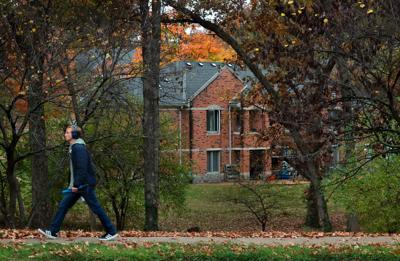CLAYTON ŌĆö Concordia Seminary is proposing a new residential subdivision, and maybe a new elementary school, on its campus here after Washington University withdrew a controversial plan to put new athletic fields on the site.
The seminary is pitching single-family homes on 27 acres of its west campus along Big Bend Boulevard, to replace student housing it is moving east near its chapel. And the Clayton School District is considering building a new elementary school there, too, to replace one or more of its three existing grade schools.
Officials said no decisions had been made and no details set. But if advanced, the project would be ClaytonŌĆÖs first new residential subdivision in decades.
ŌĆ£New housing means more people, more potential kids in the school district, more property taxes,ŌĆØ Mayor Bridget McAndrew said. ŌĆ£ItŌĆÖs exciting but itŌĆÖs a very preliminary discussion and IŌĆÖm sure there will be a lot discussions with the community moving forward.ŌĆØ
People are also reading…
Both Concordia and the Clayton School District announced their ideas for the site this week, months after WashU withdrew a request to rezone the site for an athletic fields complex that residents complained was vague in its details and would cause traffic, noise and light disturbances.
WashU had wanted to consolidate onto the Concordia property its baseball and softball fields now at Forsyth Boulevard and Big Bend, the intramural sports played at the old Christian Brothers College High School on Clayton Road, and make the new fields available to Concordia for use. The university pitched several options for the site and spent more than a year negotiating with Clayton officials for a new, special zoning district in place of its current residential zoning before withdrawing the request in January.
Concordia said this week that it still has the ŌĆ£framework of an agreementŌĆØ with WashU to use land cooperatively, but determined a residential subdivision is ŌĆ£more closely alignedŌĆØ with residentsŌĆÖ wishes and ŌĆ£can be acted upon with a reasonable period of time,ŌĆØ according to a news release.
Residents who opposed the WashU sports fields plan said they welcomed the change.
ŌĆ£A subdivision and a school are much better for our neighborhood and much better for our children,ŌĆØ said Angela Liebermann.
Jacqueline Weil, who helped organize opposition to the WashU plan, said she supported the concept but wanted to see more details.
ŌĆ£I think it would be great,ŌĆØ Weil said. ŌĆ£But I donŌĆÖt know who theyŌĆÖre going to get to build the houses, how theyŌĆÖre going to design them, how big theyŌĆÖre going to design the lots ŌĆö there are a lot of questions at this point.ŌĆØ
Concordia spokeswoman Vicki Biggs declined to say how many houses could be built on the seminaryŌĆÖs campus. The Board of Regents last month authorized a contract with a consulting firm and expects to review a final plan in August, she said.
Meanwhile, Clayton School District is considering buying part of the land from Concordia to build a new elementary school under a facilities plan designed to address the districtŌĆÖs needs over the next 15 to 20 years.
The plan prioritized changes to its three elementary schools, which range from 96 to 52 years old, because of their aging infrastructure and limited space, including Captain Elementary, the newest of the three and closest to the Concordia site. A study to determine whether to renovate each school or build anew is expected to be complete by fall.
The possible purchase comes more than a year after the district cancelled a contract to purchase the headquarters of global footwear company Caleres for $20.9 million after fierce community backlash against taking the property off the cityŌĆÖs tax rolls. The district did not explain how it would have used the property.
The land owned by Concordia is already tax-exempt and a school would fit the residential zoning use, Superintendent Nisha Patel said in a letter to parents. And it would cost less to build on because of ŌĆ£minimal demolition and preparation requirements,ŌĆØ she said.
ŌĆ£Although no decisions have been made, the property could offer the space needed for a modern, flexible school with innovation labs and open learning areas ŌĆö if the study concludes that new construction is the best path forward,ŌĆØ Patel said.
Liebermann, whose kids had completed grade school at Captain, said the school had often felt small and cramped and that officials discussed challenges to renovating the building in recent meetings.
ŌĆ£Now the school could have a place to grow,ŌĆØ she said.
Post-Dispatch photographers capture hundreds of images each week; here's a glimpse at the week of June 8, 2025. Video edited by Jenna Jones.















